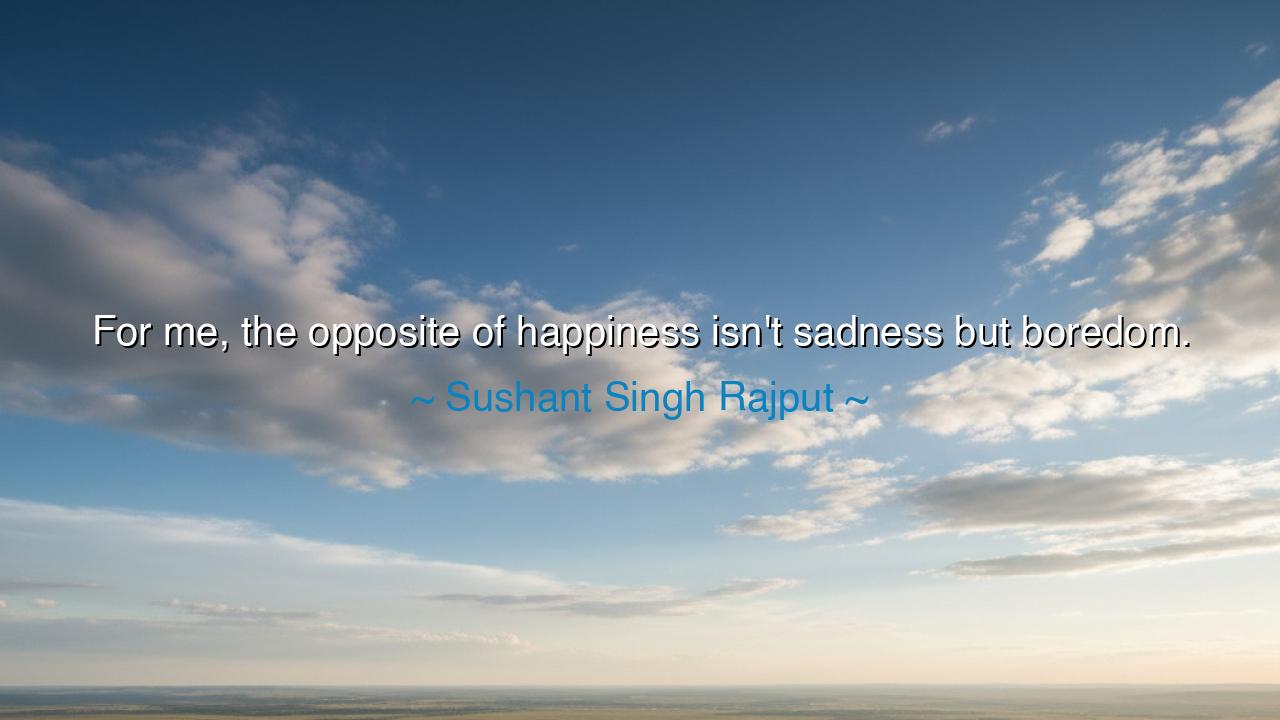
For me, the opposite of happiness isn't sadness but boredom.






“For me, the opposite of happiness isn’t sadness but boredom.” – Sushant Singh Rajput
In this profound and quietly haunting reflection, Sushant Singh Rajput reveals an understanding of the human soul that transcends the simple emotions of joy and sorrow. His words speak not of fleeting feelings, but of the deeper rhythm of existence itself — the pulse that gives meaning to life. To him, happiness is not the absence of pain, but the presence of aliveness — the feeling of being engaged, curious, and awakened to the beauty and mystery of the world. Its true opposite, therefore, is not sadness, which at least burns with passion, but boredom, the slow suffocation of the spirit when it has nothing to live or reach for. In these few words, Sushant captures the wisdom of the ancients: that the greatest tragedy is not to suffer, but to cease to feel.
The origin of this thought lies in the restless and questioning nature of Sushant himself — an actor, thinker, and seeker who never accepted the surface of life as enough. He was a man who gazed at the stars and sought patterns in the infinite. His mind, ever curious, was drawn to science, philosophy, and art. He believed that to live was to explore — to push the boundaries of one’s mind and spirit. In his words, we hear not mere melancholy, but the cry of a soul that refused to stagnate. For he knew that boredom, that dull emptiness which numbs the heart, is the true enemy of happiness, because it extinguishes wonder — and without wonder, the soul begins to die.
In truth, the ancients also understood this law of the heart. The philosopher Socrates, when asked what the greatest evil was, said it was not suffering, but ignorance — a blindness of the soul that leaves man drifting through life without purpose. Sadness, like a storm, cleanses and renews. It comes and goes, leaving wisdom in its wake. But boredom is a stillness without renewal, a drought of meaning. It makes a man neither suffer nor rejoice, but merely exist — and existence without passion is the slowest form of death. Even Nietzsche, that fire-born philosopher, declared that he would rather will suffering than will nothing at all. For in pain, there is life. But in boredom, there is nothingness.
We see this truth written again and again in the stories of those who dared to live greatly. Consider Leonardo da Vinci, who could never bear the monotony of a single pursuit. His happiness was not in comfort, but in curiosity — in the endless exploration of art, science, and invention. Had he been content to rest, his genius would have withered. Instead, he kept his spirit alive through wonder, that sacred antidote to boredom. Or think of Helen Keller, who, though blind and deaf, lived more vividly than most who see and hear. Deprived of senses, she yet discovered infinite joy in learning, in touch, in words, in ideas. Her life was proof that happiness is not bound by pleasure, but by engagement — the courage to remain awake to life, in all its forms.
In contrast, boredom is the silence of the soul when it has forgotten to seek. It creeps in when a man ceases to grow, when he trades curiosity for comfort and passion for routine. It is the disease of those who have all things but lack purpose — who live surrounded by abundance, yet starve for meaning. Sushant saw this truth clearly. He warned that the true danger of modern life is not sadness, but emptiness — a world that distracts us endlessly, yet rarely awakens us. When the mind ceases to wonder and the heart ceases to feel, even joy becomes hollow. To live without curiosity is to betray the very gift of consciousness.
And so, my children, learn from his wisdom: do not fear sadness, but fear apathy. When grief comes, meet it as a teacher; when joy visits, receive it as a friend. But when boredom approaches — when the flame of purpose flickers — awaken yourself. Feed your soul with curiosity. Read, create, love, question, explore. Let each day bring some new discovery, however small. For as long as you remain in dialogue with life, you will never be empty. True happiness lies not in constant pleasure, but in constant growth — in the dance between wonder and understanding.
The lesson of Sushant’s words is thus both tender and urgent: to be alive is to remain amazed. Happiness is not a destination but a dialogue with existence. It is the feeling of motion — of the mind stretching toward new ideas, the heart reaching toward new experiences, the soul longing toward something greater than itself. Do not let the world dull that longing. Seek not a painless life, but a meaningful one. For even in sorrow, there is movement — but in boredom, there is only stillness, and stillness is the grave of the spirit.
So remember, as Sushant Singh Rajput taught through both his art and his life: the opposite of happiness is not sadness, but boredom — the loss of wonder. Keep your eyes lifted to the stars, your heart curious, your mind alive. For as long as you are curious, you are free — and as long as you are free, happiness will find you.






AAdministratorAdministrator
Welcome, honored guests. Please leave a comment, we will respond soon